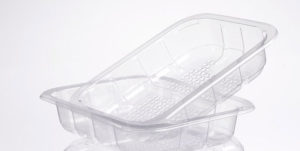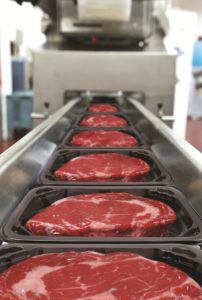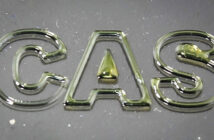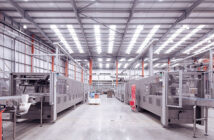Sealed Air boasts innovation and sustainability at the heart of its operation. What’s coming up in that space in 2019?
Yes, sustainability and innovation go hand in hand for Sealed Air. Last year Sealed Air Corporation announced its commitment to the 2025 Sustainability and Plastics Pledge. This really makes for an exciting time for our business and product innovation knowing that by 2025 we will advance our innovative packaging solutions to be 100% recyclable or reusable and we will accelerate the use of recycled content, targeting 50% average recycled content across our packaging portfolio. Work on this has started and is ongoing.
In line with our commitment, this year we continue to assess and optimise the product life cycle of our packaging solutions, ensuring there is a way to repurpose post-consumer packaging in our quest to leave nothing behind. We will also accelerate the use of recycled materials and lead the collaboration with partners worldwide to make this happen.
While choosing the smartest raw materials remains a top priority, ensuring the packaging is fit for use is equally important. For example, meeting the immediate needs of the consumer (plant derived, recyclable) while causing lost time and rework for the processor is not sustainable innovation. We not only need to find a solution for end of life, the package must also serve the demands of processors, retailers and consumers ensuring food safety, operational efficiencies, extended shelf life and convenience. Packaging solutions that address food waste and provide convenience are a growing priority for both consumers and retailers. And we all know a great looking package is a great way for products to stand out.
The good news is that consumers and retailers can have it all with Sealed Air’s Cryovac®️ Darfresh®️ family of packaging solutions. Cryovac® Darfresh® vacuum skin technology is a key innovation that helps address food waste across he value chain by significantly extending shelf life. Darfresh® has enabled the extension of beef to 28 days and up to 15 days for fresh poultry. Darfresh on Tray is also designed for zero film scrap, which for a typical midsized processor producing 30,000 packs per week, equates to avoiding the sending of up to 3 tonnes of scrap to landfill every year.
Darfresh on Board is the latest innovation to the Cryovac Darfresh suite of solutions. This composite material comprises paper board and Darfresh skin material to enable shelf life extension while driving premium on-shelf appeal and is a 100% recyclable solution.
For many years, Sealed Air New Zealand has been servicing the convenience food sector with compostable materials that are recoverable through both industrial and home composting units. Our latest offer for the FMCG sector is a compostable pack suited for dry, oxygen sensitive foods. It enables brand owners to tell a great story and offer a unique consumer experience. Consumers can place the empty pack into their home composting facility. Fast forward 16 weeks and there is little that remains of the pack.

How important is it for large companies such as your own to not only show they are taking sustainability seriously, but tangibly taking steps to tackle the issue?
It’s critical. Sustainability should be strategically embedded within business’ long-term goals and priorities.. Each company has to consider what sustainability means to their business, so that the types of goals are meaningful. Nearly 90% of business leaders believe that sustainability is essential to remain competitive, yet only 25% say that their companies have developed a clear business case for sustainability. Companies such as ours are a key component of the circular economy.
For Sealed Air, sustainability is a business priority as core to almost everything we do. By aligning sustainability, technology, and market forces, we have been able to create a culture that drives positive value to the industries we serve and our customers.
In addition to our commitment to the 2025 Sustainability and Plastics Pledge, we have also just announced that Sealed Air has joined the Global Alliance to End Plastic Waste, a new global organization comprising nearly 30 companies making a five-year commitment to invest $1.5 billion in solutions that help eliminate plastic waste in the environment. The Alliance is a nonprofit organization that unites companies that make, use, sell, process, collect, and recycle plastics.
Do prizes like your recent gold at the Worldstar Awards for 2018 – for your Fresh Technologies and Cryovac Freshness Plus design in the ‘packaging that saves food waste’ category – ensure that companies like yours are being commended for the innovation you undertake?
It is great to get kudos for the work we are doing and driving awareness of industry solutions to global food processing challenges is a great way for our industry to collaborate and get better. Our winning Cryovac® packaging solutions are a celebration of the collaborative effort with our customers. The awards are a celebration of those successful collaborations, we all win.
How important is it for Sealed Air to meet and exceed the needs and wants of its customers?
It’s fundamental to our survival. Our customers face resource challenges on a daily basis that force them to approach their business strategies in new ways. They demand partners with practical answers that come from deep experience, nimble application and innovation that makes change possible and delivers results. For Sealed Air, creating value for our customers is at the core of all we do.
Being a partnership, we work collaboratively with our customers, often creating solutions that address multiple challenges simultaneously. It is possible to deliver the extraordinary, to delight and surprise and deliver outstanding value, including leaving our world, environment, and communities better than we found them.
For example, Sealed Air’s collaboration with Fresh Technology revolutionised the way that avocado products are processed and packaged. It enabled producers to extend the shelf life of avocado products from 30 to 90 days, enabling exports into geographies normally unreachable. Our solution can also reduce product spoilage of avocado by 7.2 tonnes in addition to supporting wider distribution. This is a proud demonstration of how our business partnerships work.
What new technology will be revealed by the company this year?
Sealed Air thrives on innovation and new technologies.
Sealed Air Smart Services is an expansive set of solutions for customers around the globe. Our service helps customers address a range of challenges specific to the food industry improving operational efficiency, food safety and product quality while reducing total cost. Sealed Air is continuing the development of its smart services. An exciting development is with our Bubble Wrap IB, a revolution in the protective packaging industry. Our flexible, protective air-cellular solution can be inflated on-demand in whatever quantity is required. Shipped flat, stored flat, and ready when you need it, Bubble Wrap IB drastically reduces the impact of freight costs and carries a significantly smaller carbon footprint while revolutionising warehouse storage. It’s an eloquent, practical and significantly more cost efficient product compared with shipping packaging which is pre-inflated.
What do you see as the ‘issues of the year’ for the food and beverage packaging sector in New Zealand
As New Zealand’s population reaches the 2019 forecast of 5.05 million, the need for products and packaging that satisfies a wider consumer preference increases. Add the progression to online “Click and Collect” shopping and new developments to ensure the availability of high-quality products for consumers becomes more critically important. The industry, as a whole, needs to find that balance between reducing the environmental footprint and meeting the needs of consumers who demand convenient, safe, fresh food and other grocery products.
The challenges associated with food waste also need to be addressed. The critical role packaging plays in reducing food waste is very much underestimated. In all too many cases, the consumer sees packaging as unnecessary, and (understandably, most often) fails to understand why the food is packaged, and what beneficial purpose is served by the packaging. Packaging can minimise energy investments in producing, growing and processing food, as well as transport, retailing, shopping and storage. Ongoing consumer education regarding food waste and changing packaging formats are only one part of the solution; retailers must also address changes to supply chains, consumer perceptions and tradition if they are to achieve change.
While the grocery store is evolving, online e-commerce is growing much faster than the physical store sector and should be considered an additional retail channel. There is an increase in the development of recyclable, reusable and compostable packaging, however, plastic packaging reduction continues to be a major challenge. This online grocery, which currently accounts for 3%-4% of total grocery sales in New Zealand, continues to drive growth, and we expect that growth to accelerate in 2019 as retailers meet rising consumer demand with the continued roll out of their e-commerce programs and further investment into business sustainability.
Keeping food fresh and safe is a priority and many companies are focusing on transparency throughout the supply chain to meet these needs. The demand for vacuum packaging is also increasing because of its ability to keep food fresher for longer. This is especially important with the e-commerce trend of rapidly increasing home delivery of fresh protein items.
Where do you see the packaging market in 50 years’ time?
Packaging will continue to innovate and provide even greater sustainable solutions. Our society will demand that everything can be re-purposed so that nothing is wasted or left behind. The research Sealed Air is currently undertaking is particularly exciting as it shows that future packaging will consist entirely of recyclable or reusable materials. Extending product shelf life and creating opportunities to collaborate with raw material suppliers will help protect investments throughout the food chain, from paddock to plate and beyond.
The disruption of the retail sector by direct-to-consumer brands will continue and packaging will be a more critical component of the e-commerce strategy. Sealed Air’s total system approach – from total inside-out protection to tracking technology – will help our customers find efficiencies and high-level quality, enabling them to consistently deliver a positive consumer experience.

Kevin Piccione – VP Sealed Air APAC
Being smarter will yield results, new opportunities and will allow us to leave our planet in a better place, reducing the burden on natural resource and creating a new industry that thrives on repurposing. Sealed Air has actively engaged on this path and is already delivering tangible benefits for our customers. Hopefully, consumers will view packaging as an essential contributor to ensuring food is not wasted and be content that once they’ve removed a food item, they will know exactly what to do with the packaging, in the secure knowledge that it will be dealt with in a manner acceptable to all. And, if our dreams come true, our oceans and landfills will be free of plastic!
For more information click here





























































































